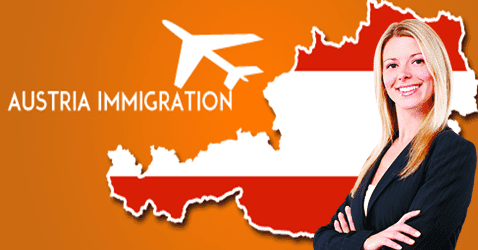In this post, we outline the ins and outs of Austrian visas, as well as permanent residence and citizenship options, for people looking to move to Austria.
For those looking to visit or move to the beautiful alpine country, it’s important to understand how Austrian visas work. After all, between short and long-term visas, residence permits, and citizenship, there are a lot of options to consider. That said, Austrian visa opportunities do vary depending on an applicant’s nationality, therefore, it is important to do your homework.
To get you started, this helpful guide outlines the different types of Austrian visas as well as what to do when you arrive in the country and how to make appeals and complaints. It includes the following information:
- Immigration in Austria
- Who needs an Austrian visa?
- Types of Austrian visas
- Short-term Austrian visas
- Temporary residence permits in Austria
- Permanent residence permits in Austria
- Asylum-seekers and refugees in Austria
- Residence and citizenship in Austria
- Arriving in Austria
- Appeals and complaints
Immigration in Austria
Thanks to its high standard of living and great work-life balance, Austria is a popular destination for those looking to move abroad. In fact, in 2017, 19% of the population living in Austria was born in a foreign country. And this number was higher in big cities such as Vienna, where the foreign-born population was 30% in 2019.
Family walking along the promenade in Hallstatt
Because Austria is part of the Schengen Agreement, which allows other Europeans to enter and work in the country, many travellers are European, with British citizens forming 10% of the population in 2018.
For non-Europeans, also called third-country nationals, immigrating will likely depend on finding an employer in Austria to serve as a sponsor. If you are planning to immigrate to Austria, you will have to begin the process at the Austrian consulate in your home country.
Who Needs an Austrian Visa?
Like in many countries, the type of visa you will need to live and work in Austria will depend on your country of origin, as outlined below.
- EU/EFTA Nationals: Citizens of the EU do not need a visa to travel to or stay in Austria for up to three months. To stay longer, you will need to register with your municipality.
- Closeup of a German ID card: If you plan to stay longer, you need to show one of the following:
- proof of employment or self-employment
- evidence that you can support yourself financially and that you have
- adequate health insurance
- proof of attendance at an Austrian school and sufficient financial means and adequate health insurance
Non-EU/EFTA Nationals: Visa options became much more complicated when it comes to non-EU citizens. Citizens of some countries, such as Canada or the USA, do not need an entry visa for stays up to three months. Citizens of other countries, however, do need an entry visa, so be sure to do your research to find out the application and entry requirements based on your nationality.
Types of Austrian visa
If you are planning to visit or live in Austria, you may need a visa. Your nationality and reason for your visit will determine whether or not you need an Austrian visa, as well as what kind. Here are the general types of visas for Austria:
- Short-term visas: these visas allow you to stay in Austria for six months or less and do not automatically include authorization to work
- Temporary residence permits: these longer-term visas are designed for those planning to stay longer than six months or those planning to be in Austria for a specific time or purpose, such as study or research.
- Permanent residence permits: these long-term visas are ideal for people who plan to stay in Austria for an indefinite period and for those who want to work. This includes people with employment contracts as well as those hoping to bring their family over through the family visa.
You will find more information and resources, such as eligibility, timelines, and how to apply for an Austrian visa, below.
Short-term Austrian visas
Short-term visas allow you to stay in Austria for a limited amount of time and do not automatically allow you to legally work. For more information, check out this government site.
A Visa:
Visas, or Air Transit Visas, allow travellers to travel through an Austrian airport, for example, as a stop-over on their journey. Austria only requires this visa from certain nationalities, so be sure to do your homework and find out if this applies to you.
Family walking through an airport
To find out costs, and timelines, and to apply, you will need to go through the Austrian consulate in your home country. Just keep in mind that an A Visa cannot be issued upon arrival.
C Visa
Would You Like To Apply For This Jobs/Sponsorship?
Enter Your Email Address HERE & You Will Receive a Notification About Your Application. If it shows "Subscribed" CLICK HERE to follow on Telegram for updatesThe C Visa is Austria’s tourist visa and can be issued for up to 90 days within 180 days. This would apply to third-country nationals that do not already have visa-free entry to Austria. Holding a C Visa entitles you to travel freely within the Schengen area for the duration of your visa. To apply, contact the Austrian consulate in your home country.
D Visa
The D Visa allows you to stay in Austria for anywhere between 91 and 180 days. In some special circumstances, this can be extended to 12 months. This visa does not allow you to work, so it can be a useful option, for example, for students spending a semester abroad in Austria. For both the C and D Visa, you can apply up to six months before the date of travel. As always, be sure to apply at the Austrian consulate in your home country.
C Visa and D Visa for “gainful employment”
In some rarer cases, you may be able to get a visa allowing you to stay in Austria for up to six months and work. In German, these are called Visum C-Erwerb and Visum D-Erwerb. These short-term work authorization visas are handy and can allow you to have an internship, which is considered gainful employment even if it’s unpaid. They can also be used to invite scientists or lecturers to the country on a short-term basis. This visa has no cost and you should apply for one at your local Austrian consulate. That said, in some cases, for example, if you are being hired as a researcher by certain institutions, the research institution will handle much of the application process.
Temporary residence permits in Austria
If you are a third-country national and plan to stay in Austria for longer than six months, or if you plan to work, you will need a residence permit based on the reason for your stay. There are several different ways to get a residence permit, but below are a few of the most common.
Student:
If you have been accepted as a student at an Austrian university, you will need to apply for a study permit at your local Austrian consulate. This permit will last as long as your study and entitles you to live and study in Austria. However, it does not entitle you to work in Austria.
Students at university:
If you are a third-country national who needs an Austrian visa to enter the country, you will need to apply for a Visa D to initially enter Austria to get your study visa.
Researcher:
If you plan to pursue scientific research and teach at a high academic level in Austria, you will need relevant permission to do so. Researchers with a PhD who has a Hosting Agreement with a certified research institution should apply for a Settlement Permit – Researcher.
This permit is usually good for two years, or three months longer than the duration of your hosting agreement. If you are a researcher planning to teach and conduct research in Austria, but you do not have a hosting agreement, you may apply for a Settlement Permit – Special Cases of Gainful Employment. This permit is valid for 12 months and is renewable.
Au pair:
If you are interested in living with an Austrian family and receiving a small weekly allowance in exchange for taking care of their children, you might consider being an au pair. This is so common that there is even a special residence permit for it, called Special Cases of Paid Employment.
The au pair visa, called Sonderfälle der unselbstständigen Erwerbstätigkeit in German, must be applied for in your home country once you have found a host family. The permit can last up to 12 months. For information about how to apply, check out this government site.
Permanent Residence Permits in Austria
Third-party nationals who would like to stay and work in Austria indefinitely will need a permanent residence permit. Keep in mind, though, that in Austria, permanent doesn’t mean that you are entitled to stay forever; rather that there may not be a specific time limit on your visa, and you can work. Conveniently, for this category of visa, everything is funnelled through one residence permit. You can read more about this in our Guide to permanent residence in Austria.
Red-White-Red Card:
For third-party nationals, the Red-White-Red Card serves as both a residence permit and work authorization. Most people who have one received it based on their employment.
Its length is usually tied to the purpose of the visa, such as an employment contract, but is usually 24 months and is renewable. With this card, you can travel freely throughout the Schengen area. Those who can apply for one include the following:
- Very highly skilled workers
- Self-employed key workers
- Start-up founders
- Skilled workers in occupations experiencing a shortage of staff
- Graduates of Austrian universities and higher education colleges
- Other key workers
- Red-White-Red Plus Card
Third-party nationals who wish to bring their families to Austria will need to apply for a family visa, also called a Red-White-Red Plus Card. This permit allows certain family members to stay in Austria as long as the initial sponsor has their residence permit.
The initial permit lasts for one year but can be renewed, and you can travel throughout the Schengen with it.
Residence and citizenship in Austria
If you would like to be able to stay in Austria permanently, you must meet certain conditions, as follows.
- Lived in Austria for the past five years, uninterrupted
- Supported yourself financially, whether through a job, self-employment, or independent means
- Maintained health insurance
- Maintained adequate, registered accommodation
- Completed Module 2 of the Integration Agreement, including reaching a B1 level of German
- Not be a threat to public security or order
Citizenship in Austria
To become a citizen of Austria, you must meet the following criteria:
- You have lived in Austria for at least 10 years continuously, five of which you were a permanent resident
- Have supported yourself financially
- Have sufficient knowledge of German
- Hold no criminal record
- Have a positive attitude towards Austria
Arriving in Austria
The first thing you should do when you arrive in Austria is register with your local municipality. If you don’t do so within three days, you risk getting a hefty fine. Your employer will take care of enrolling you in health insurance and your monthly contribution will be deducted from your salary automatically.
The only time-consuming thing might be opening a bank account because you need proof of identity, proof of employment, and proof of residency. You might also need to wait until you receive your residence permit.
Appeals and complaints
If your application for a residence permit is denied, you will be able to appeal the decision. Within your denial letter, the provincial authority will provide information about further steps you can take to appeal, and the general timeline. In that case, it would be prudent to seek legal or immigration counsel.
Conclusion
On a final note, relocation to Austria will be easy if you follow the due procedures. Make sure you go through the guide above to know the Visa you are eligible to apply for.







good evening. This is my dream. And America!!! I am interested in your work. and please help me get a work visa. I’m 41 and I’m from Uzbekistan. I am married and have 3 children!!! Thanks, I’m waiting for answers!!!
How are you sir /madm am very interested to work with you